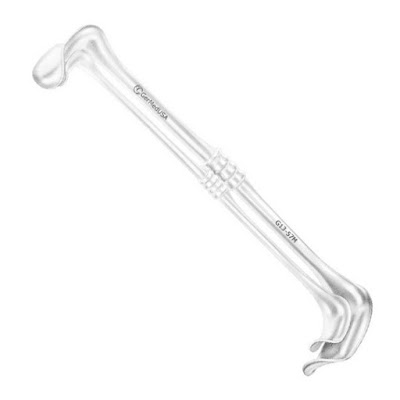Most Richardson Retractors are produced with various blade definitions, depending on the surgical material being retracted and surgical specialty.
The Richardson Retractor is an incredible surgical
instrument widely used for chest and abdominal surgery. It is also suitable for
Cesarean section, laparotomy, and appendectomy. Single and double-ended
retractors are used according to the surgeon's preferences. However,
double-ended patterns are used for abdominal surgeries. The non-slippery handle
provides extra support to the fingers, palm, and wrist of the user. Richardson
Retractor is offered with various blade depths and width depending
on the abdominal surgical type being performed and the thickness of the
patient's skin.
Common Uses of Richardson Retractor
It is widely used for a range of medical approaches and
surgical procedures, but it is specified for some common uses.
Check out the specific uses for this versatile instrument!
- Used to expose, retract, or push organs, muscles, tissues, or bones during the surgery.
- This hand-held retractor determines the depth of the incision.
- The smaller model helps hold back skin and smaller tissues.
- The larger model is used to retract heavy tissues, bones, or muscles in deeper cavities.
- Used to reduce trauma while surgery
It is available in multiple depths and widths variations of
blades in order to suit the best surgical need. It comes with a grip handle, a
standard hollow loop handle, and a lamb handle.
Richardson Retractor Points of Inspection
Inspecting your surgical instrument is a very crucial and
important process. Every instrument has a unique point of inspection.
Appropriate examination of the instrument helps in proper maintenance and
repairs.
Below are important points of inspection for this retractor.
Non-slippery handle:
This incredible handle gives a strong grip while in surgery. Surgeons can easily
perform whole surgical procedures without any doubt of slippage. The handle
also ensures exposing the surgical site and gives better visualization to
surgeons. Inspect the handle is long, delicate, and gives the best gripping
ability. This point of inspection is very important before buying the
instrument.
Delicate Blade:
The blade structure is significant in cutting and retracting the tissues or
organs. The wound edges are open by holding back the incisions. Inspection of the
blade ensures that it is smoothly cut the tissues without any hindrance.
Tip configuration:
It ensures retraction at the right surgical site without damaging nearby
tissues or organs. Inspection of this part shows that the tip is delicate or
smooth with a slightly angled structure. The tip is free from any germ or
infection prior to use in any surgical procedures.
After inspecting all these parts, the whole body structure
manufacturing is also important for the healthcare provider. The retractor must
be manufactured from high-grade German surgical stainless material that gives
high-tensile strength and corrosion resistance against environmental changes. The
instrument must be reused after sterilization. The high-grade material allows
easy sterilization without affecting the instrument body.
All these significant points are important while you are
looking for the best retractor for your surgical procedures. We endeavor to
provide you the best information that may helpful for you before buying this
instrument.

Post a Comment